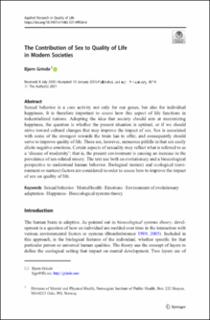| dc.contributor.author | Grinde, Bjørn | |
| dc.date.accessioned | 2021-03-23T11:18:09Z | |
| dc.date.available | 2021-03-23T11:18:09Z | |
| dc.date.created | 2021-03-22T14:22:36Z | |
| dc.date.issued | 2021 | |
| dc.identifier.citation | Applied Research in Quality of Life. 2021, . | |
| dc.identifier.issn | 1871-2584 | |
| dc.identifier.uri | https://hdl.handle.net/11250/2735062 | |
| dc.description.abstract | Sexual behavior is a core activity not only for our genes, but also for individual happiness. It is therefore important to assess how this aspect of life functions in industrialized nations. Adopting the idea that society should aim at maximizing happiness, the question is whether the present situation is optimal, or if we should strive toward cultural changes that may improve the impact of sex. Sex is associated with some of the strongest rewards the brain has to offer, and consequently should serve to improve quality of life. There are, however, numerous pitfalls in that sex easily elicits negative emotions. Certain aspects of sexuality may reflect what is referred to as a ‘disease of modernity’; that is, the present environment is causing an increase in the prevalence of sex-related misery. The text use both an evolutionary and a bioecological perspective to understand human behavior. Biological (nature) and ecological (environment or nurture) factors are considered in order to assess how to improve the impact of sex on quality of life. | |
| dc.language.iso | eng | |
| dc.relation.uri | https://link.springer.com/content/pdf/10.1007/s11482-021-09926-6.pdf | |
| dc.title | The Contribution of Sex to Quality of Life in Modern Societies | |
| dc.type | Peer reviewed | |
| dc.type | Journal article | |
| dc.description.version | publishedVersion | |
| dc.source.pagenumber | 17 | |
| dc.source.journal | Applied Research in Quality of Life | |
| dc.identifier.doi | 10.1007/s11482-021-09926-6 | |
| dc.identifier.cristin | 1899934 | |
| cristin.ispublished | true | |
| cristin.fulltext | original | |
| cristin.qualitycode | 1 | |
